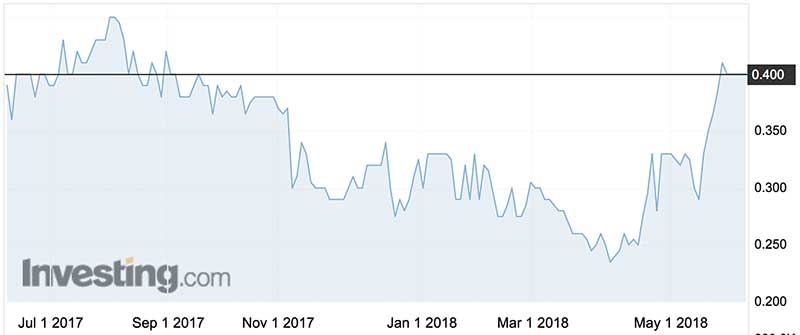Why superbug tester Genetic Signatures is hoping for a big flu season

Pic: Godji10 / iStock / Getty Images Plus via Getty Images
We’re sure the molecular diagnostics house doesn’t gloat on the misfortunes of others, but last year’s horror ’flu season was a ripper for the company.
In management’s more measured parlance, Genetic Signatures (not to be confused with DNA tester now blockchain aspirant Genetic Technologies) benefited from last year’s “particularly adverse domestic flu season”.
Genetic Signatures’ (ASX:GSS) 3base testing technology targets conditions that require a faster and more accurate diagnosis, delivering just that by using a unique technique.
Sold under the Easyscreen brand, Genetic Signatures has five test kit variations and 12 in development.
The extant ones cover the killer ’flu, gastroenteric woes, flavivirus/alphavirus, antibiotic resistant bugs and — most importantly for some — sexually transmitted infections (STIs).
Flaviviruses are spread by mozzies and ticks and include zika and west Nile viruses.
The company is also trialling kits for meningitis.
Genetic Signatures’ most advanced product, Easyscreen Enteric detects more than 20 tummy bugs. These include the dreaded norovirus, which has turned many a pleasant P&O cruise into a marathon maritime chunder-thon.
Influenza is among 14 nasties the company’s respiratory test targets, but an important one.
“We are certainly gearing up to supply more tests for the upcoming ’flu season,” Dr Melki says.
“After all, we make diagnostics to try to save lives.”

Quicker, better diagnosis
The tests are based on the company’s 3base proprietary technology which “optimises DNA analysis by simplifying the natural sequences, resulting in faster and more accurate analysis”.
3base takes the genetic information of the targeted organism and then changes the genetic sequence to make it easier to detect.
In essence, the test reduces the variables from one million to 60,000, with turnaround time for the client pathology laboratories reduced from five days to less than five hours.
“We can do what no-one else can,” Dr Melki says. “For example, we can look for 20 causes of gastro [enteritis] and do 200 tests at a time.”
Genetic Signatures competes with other molecular diagnostics outfits, as well as the traditional agar plate testing.
The story to date
Genetic Signatures can date its ASX history to March 2015, when it debuted after raising $7.5 million at 40c apiece, but the company was created in 2001, based on technology developed under the guidance of the late Dr Geoffrey Grigg.
And, yes, there has to be a CSIRO link: Dr Grigg worked for the esteemed public institution in the 1990s.
Dr Grigg also founded the listed Cambridge Antibody Technologies and Peptide, so if there were a Biotech Hall of Fame, Doc Grigg would have to be in it.
Dr Melki joined the company in 2003, having researched DNA and microarray technologies. For his efforts, the Doctor of Philosophy was awarded the Sydney University Peter Bancroft Prize in 2001.
Board member Dr Tony Radford is also a biotech old hand, having co-founded the tuberculosis diagnosis outfit Cellestis (acquired by Germany’s Qiagen).
Dr Radford’s outstanding discipline and impeccable grammar can be attributed to being taught by your columnist’s late father, an English master who kept errant and students in line with the help of flying chalk.
Regulatory progress
Genetic Signatures government relations people have their clip-boards full, given the company’s busy slate of regulatory approval applications.
Genetic Signatures already has an approved product in Australia and Europe for enteric testing. In April the Europeans approved its antibiotic resistance (superbug) testing kits and the local Therapeutic Goods Administration followed suit in mid May.
The European enteric market alone is worth $US86 million a year.
The company has applied for TGA and European approval for its respiratory, STI and flavivirus/alphavirus tests and is also seeking US approval for enteric and antibiotic resistance testing.
“We have now put nine products through CE Mark and TGA [regulatory procedures] so it’s something we understand quite well,” Dr Melki says.
The Australian market accounts for only 1.25 percent of the global molecular diagnostics market, which the company values at $US7.6 billion, or thereabouts.
The company is also gaining favour in the Emerald Isle, which has just declared a superbug epidemic a national health emergency.
Ireland’s CPE Reference Laboratory last month said it had tested the antibiotic kits and liked what it saw. The researchers then re-checked the results, to be sure, to be sure.
Sound financial diagnosis
Genetic Signatures’ revenues have steadily increased from $300,000 in 2012-13 to $2 million in 2016-17 and $1.4 million for the December half year (up 55 per cent).
Dr Melki won’t reveal the cost of the tests, but notes that they are consumable single-use items. He adds that customers can use their existing equipment to carry out the tests, so don’t need a capital outlay.
“Our goal is to have the tests used in a routine way, so it has to be affordable and bring value to the lab,” he says.
Genetic Signatures last raised $14 million a year ago in a placement and share purchase plan, to support the regulatory approval process, but with cash of $11 million it’s not desperate to raise more.
Dr Boreham’s (non-molecular) diagnosis:
One doesn’t need a cutting-edge DNA detection kit to work out that Genetic Signatures has disappointed investors, despite the steady revenue growth.
Genetic shares peaked at 90c in January 2016 and sunk to a recent (February 18) low of 27.5 cents.
But revenues are heading the right way and will take off in a hockey-stick manner if the company wins the expected regulatory approvals. In fact, the shares enjoyed a nice leg-up after last month’s TGA win.
The broader molecular diagnostics sector is well-competed and has also been subject to some big-ticket transactions.
In January this year, Qiagen acquired the like-minded private Spanish mob Stat-Dx for $US191 million.
The blushing Genetic Signatures can boast a not-so-secret admirer in the guise of 38 per cent shareholder Christopher Abbott.
The octogenarian Mr Abbott is best known as co-founder of the boutique investment house Maple Brown Abbott and a keen supporter of the biotech sector.
Mr Abbott was a shareholder on listing and has topped-up along the way and has never sold. That’s loyalty.
Let’s hope his enthusiasm is as contagious as the indications the company has targeted for testing.
This column first appeared in Biotech Daily
Disclosure: Dr Boreham is not a qualified medical practitioner and does not possess a doctorate of any sort. The last time he caught the ’flu, he didn’t need a molecular test kit to diagnose it.
This article does not constitute financial product advice. You should consider obtaining independent advice before making any financial decisions. The content of this article was not selected, modified or otherwise controlled by Stockhead. Stockhead has not provided, endorsed or otherwise assumed responsibility for any financial product advice contained in this article.
UNLOCK INSIGHTS
Discover the untold stories of emerging ASX stocks.
Daily news and expert analysis, it's free to subscribe.
By proceeding, you confirm you understand that we handle personal information in accordance with our Privacy Policy.








